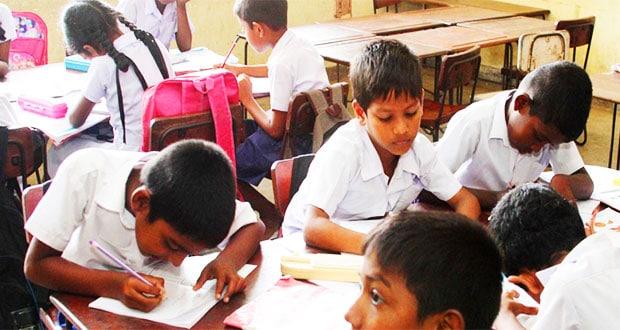Written by a 14-year-old child
As children, we come to realize that even as we go to school, a seemingly ungratified privilege amongst the most of us, that there are numerous troubles that we find ourselves having to endure. As a child, being one with somewhat less authority and respect, we are undermined due to problems of both adults and other children alike, may find ourselves distressed or angry from time to time. Harboring negative emotions such as these disturb our physical and mental health, act as a disturbance to our educational experience, and subject us to larger negative outbursts. However, there are many solutions to these problems that are applied through what we know as the Noble Dhamma that must be practiced in order to see its results.
Ability of recalling another’s good qualities
Now suppose you have been asked a question by a teacher, and you answer your best, considering all aspects that seem important, but the answer is wrong. The teacher then scolds you for lack of knowledge or practice in whatever subject. Normally, a response like this would cause feelings of embarrassment or sadness in a child after being put under stress. In other circumstances, the child may get angry and proceed to argue with the elder, perhaps taking action against him/her and others. No matter which, these feelings do not help in maintaining a good relationship with whatever teacher or elder it may be. What we must have however, is loving kindness.
What we must always have, is the ability of recalling another’s good qualities. You must think, ‘even though this teacher may be ill-tempered, he/she has helped me in the past, and sacrificed his/her time to educate me so that I am prepared for the future. Therefore, I should refrain from becoming angry and pay reverence and have gratitude for their good qualities.’ When we remember the good qualities of a person, despite the anger that they may show at the time, we become aware or realize that there is little need to become angry ourselves, which could make us ungrateful and ignorant towards their goodness. We become calm, and in the case of teachers, it helps us to maintain much-needed respect towards them who would most-likely be pointing out your flaws for our own benefit.
Now this method of taming yourself is applicable for anyone who may lose their temper at you. Although, it is a very difficult one to master. However difficult, we must practice this diligently in order to overcome our anger and possible negative outbursts towards other people, as children it is very important to be able to focus on learning without letting emotions interfere.
If it is not under our control
One of the most common difficulties you will face during school is bullying. Everyone has to have been bullied at least once in their lives. It is a normal part of school-life but also a very difficult one that makes negativity come into play. In most instances, the actions of bullies will make us feel small, sad and humiliated, distracting us from studies and social life. It can take up a lot of our minds time which makes focusing difficult and being at a happy mentality something rare.
However, there is one universal thing that we must believe in to be able to overcome these thoughts. That is that the world around us in not under our control. If it is not under our control, then surely things will not always turn out the way we want them to be. And so becoming angry, sad or fearful because of an incident does not seem to really matter after a while, since we cannot expect something pleasant in the first place. We must be prepared for whatever is thrown at us.
The world is impermanent as you know and everything is changing. Even the things we love or desire will not remain, as with the things that happen to us. And so, in knowing this, we cannot risk being overpowered by reactions that will do us no good and distract us. We must develop loving kindness in order to not feel the negativity of others around us and to react with compassion no matter what. Then only can we cope with the difficulties we face growing up and be able to realize the Dhamma for true bliss.
Something that upsets us
Loss is also a difficult aspect of school life as you may well already know. Most people will have lost things in school such as: things that they cherish, at a game or competition, or their places in exams. Either way, it is something that upsets us at the very least, affecting others more seriously. However, what we must understand is the impermanent nature of this world. As told before, this world is not under our control and never will be and so, we must be able to cope with its rapid changes. As by the word of the Buddha, you cannot always win whatever it is you desire, and there will always be loss in your life. Losing can be seen somewhat as a good thing for the better experience of a person. It lets us understand this concept taught by the Supreme Buddha, helping us adjust and to not dwell on these emotions of regret or remorse. It lets us understand, as said before, how impermanent the world is. When we comprehend this aspect of life that most tend to ignore, we get into the habit of thinking that even though I have lost, whatever it is I wanted to gain would not have lasted anyway.
Understand and organize everything that you do
School life can become extremely stressful to say the least. As we move up through the years of school, we find that the workload only builds onto previous measures. Keeping up with studies, projects and other school activities can become increasingly difficult, taking up the mind-space of children so that it is difficult to think of anything else. It is something that we have all felt, but it being a new experience for children each time they move up, they are more prone to suffer. Stress of this sort can cause depression, taking away the ability for children to be happy and accepting, which is why most children (especially adolescents) tend to show signs of negativity towards parents or siblings. What we must have in order to overcome this problem is determination, patience and loving kindness to overcome the anger surged by these situations. Yes, the workload will be heavy as you grow up in school, and it is true that sometimes it can be too much to handle, studying multiple subjects in detail. However, if we plan and have organization – which is also an important aspect of Buddhism in order to be clear in your path – we can section out work into smaller tasks that we can better accomplish.
One cannot dive straight into the most complicated and deep areas without going through the basics step by step. Having mastered them we can attempt to make the larger leaps. The same goes for a child attempting work. Understand and organize everything that you do. Only if you are confident in lesser work can you move on to more advanced parts.
When we understand that these troubles can all be overcome by concepts in the Dhamma, we will see how precious it really is. These problems are all ones that are common in life. We find that sometimes it is far from what we can handle. However, when we look at the concepts in the Dhamma and practice them diligently – loving kindness, patience, understanding impermanence etc. – we can realize how blind we have been to the solutions to these problems. Hence, in knowing and understanding the importance of the Dhamma in real life, may we all be able to acknowledge it for the benefit of our mental and physical states and to be able to realize it in this very life!
Paradukkhūpadhānena – attano sukhamicchati;
Verasaṃsaggasaṃsaṭṭho – verā so na parimuccati.
Those who seek their own happiness by causing suffering for others are entangled with hate. They will never be free from hate.
(Buddha)
Vishmi Caldera
A student of English Dhamma Program
Mahamevnawa Bodhignana Meditation Monastery, Kaduwela.













What are the gathas sutra’s a school student should recite when paying homage to lord Budhdha.The basic sutra’s